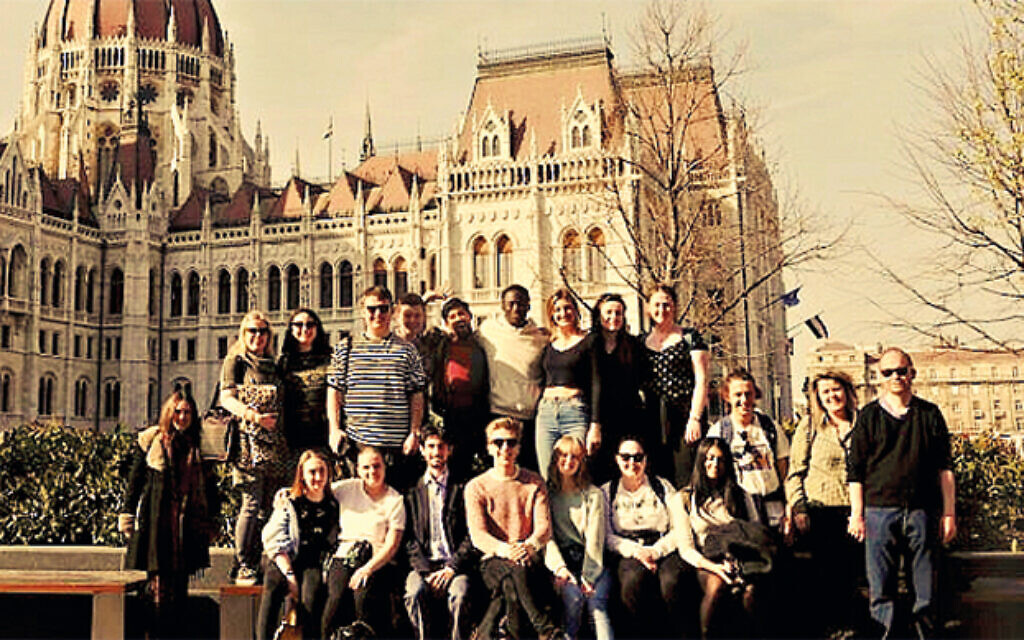Muslim community takes Holocaust learning to heart
Educators tell Jewish News why it's important to share lessons from the past
Holocaust educators operate up and down the country, talking to people of all ages, genders, ethnicities, nationalities, religions and races. On the face of it, there should be no difference whatsoever – people are people.
Yet poll after poll, year after year, has shown that attitudes in the Muslim community can be less tolerant on the Holocaust than the national average, and that antisemitic attitudes can be more prevalent. Given that, and given the running sore that is the Israeli-Palestinian conflict, Jewish News asked three Muslim Holocaust educators whether they experience any particular or unique challenges.
Harjyot Hayer, a Year 6 history teacher at Peel Park Primary School in Bradford, covers the Second World War with her young charges – how it started, whether Britain should have gone to war earlier, life on the home front… and the Holocaust.
Get The Jewish News Daily Edition by email and never miss our top stories Free Sign Up
“Things like Anne Frank’s diary are a really useful way for children to understand about persecution and tolerance, or lack of,” she says. “We’ve looked at primary sources, of Jewish people in Vienna having to clean the streets, and the progression of persecution – how it starts, how it escalates. They’re only 10 to 11 years old, so we don’t talk much about the camps.”
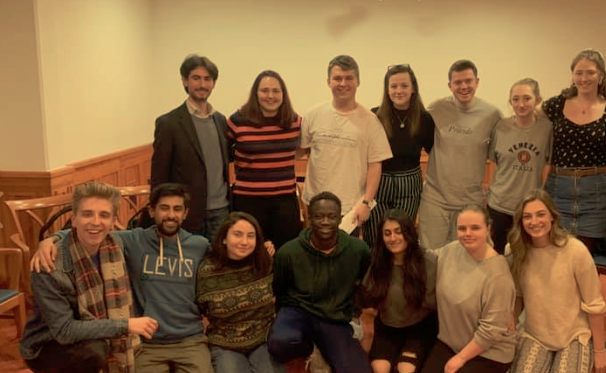
Two years ago, Hayer brought in Shannen Johnson, a learning and engagement officer at the Peace Museum in Bradford, to deliver a workshop called ‘Everyone Comes From Somewhere’, profiling the real-life story of a young Jewish boy who fled Germany and sought sanctuary in Bradford.
“It ties in really well,” says Hayer. “It links with contemporary themes such as refugees, asylum, how we receive people in our area. Shannen brings in a replica suitcase and gets the children to think about what they’d take.”
She continues: “We talk about Jewish persecution. A lot of these children are from religious backgrounds and go to mosque after school, so they identify with the concept of respecting religion, because they would expect respect for their own.”
Discussing Anne Frank or the Jewish boy who fled to Bradford, Hayer says: “In a lovely way, the children are still very naïve. They find it really shocking that a child would have to hide.”
They’ve looked at civil rights in the context of black history, she says, so the children are learning about racism, but think it is something historic. “Because they’re not racist themselves and don’t see it, they think it [racism, antisemitism, persecution] is a relic of the past, which is
a lovely bubble to be in for the time being.”
From her perspective, she says there are no specific cultural sensitivities when teaching the Holocaust to her Muslim pupils “because it’s just about respect and tolerance”, but Junaid Iqbal, a 21-year-old Muslim ambassador for the Holocaust Educational Trust (HET), says there are certain differences once children get older.
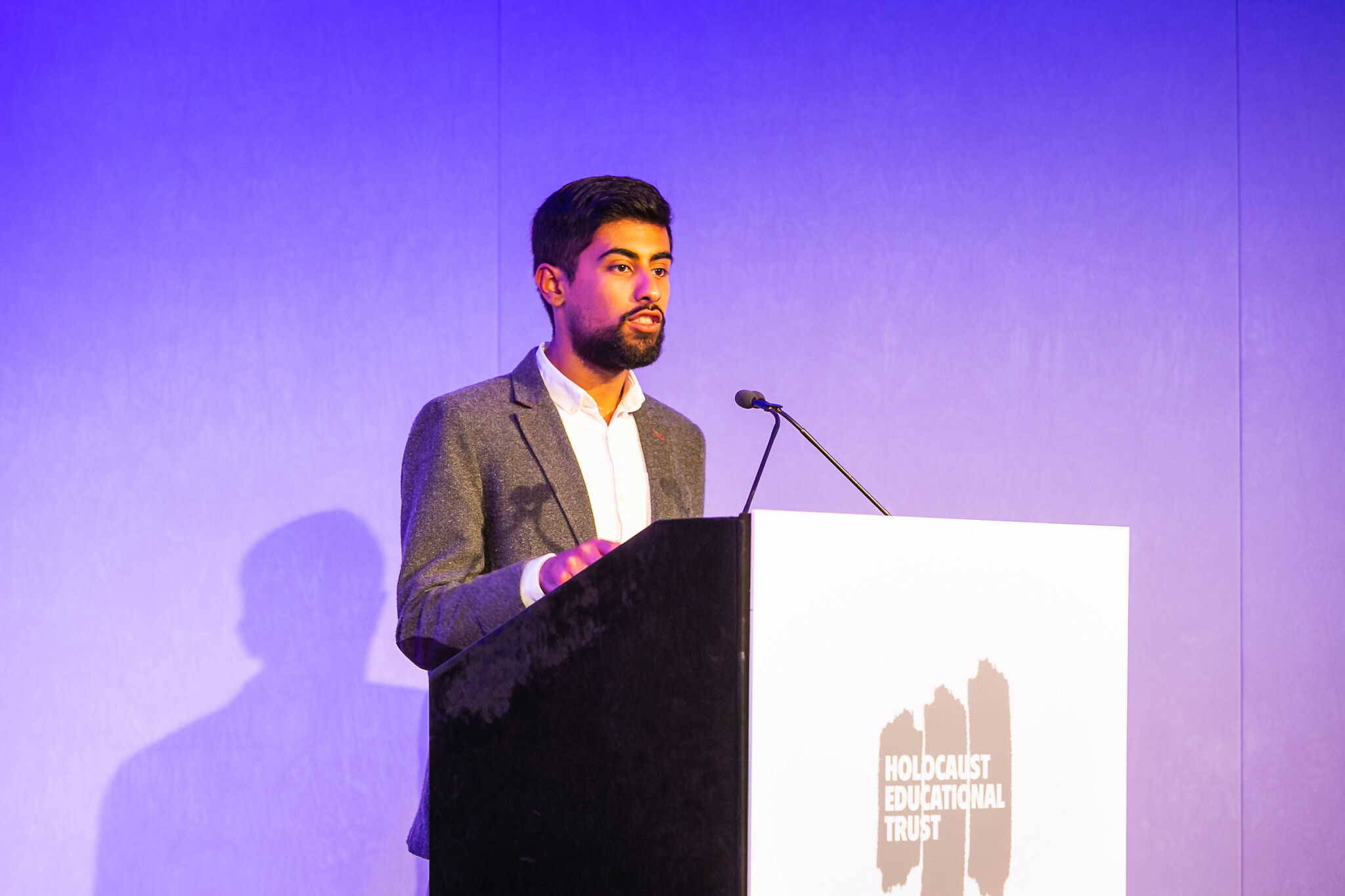
A law student at Lancaster University, Iqbal grew up in a Muslim family in Burnley with parents from Pakistan. At school, he attended HET’s Lessons from Auschwitz programme, which included a one-day trip to the camp.
“I gave an assembly in my school about what we learned, and I organised projects in my Muslim community,” he says, explaining that he has since been on a study visit to Yad Vashem and to Budapest to learn the untold story of Hungarian Jews.
“For many of my friends and family what I told them was all very new. Many had never learned about the Holocaust, because it’s not part of the curriculum in Pakistan. They only knew bits and bobs, mostly from the media.
“For instance, my parents only knew that a large number of Jews were murdered, nothing else. They didn’t know how it came about, what led to it, Nazi policies, the acquiescence of the local population, how ancient narratives of Jews, which are mostly stereotypical and negative, played a big part, none of that.”
Iqbal doesn’t blame his parents for not knowing – they were never taught – but says he has come across the same kind of negative stereotypes of Jews in the Muslim community today, such as ‘Jew’ being used as a slur.
He heard it on the National Citizen Service scheme, he says. “I was a senior mentor, and some of the young people would use this term. I challenged them, asked them why they would call someone a ‘Jew’ when it was not a negative word. They quickly learned. You have to. Serious racism begins with small acts like this.”
When he came to educate young Muslims, he says they “knew a lot more about it than the older generation in the Muslim community, and it was entirely positive – they listened and were sensitive to what we were saying”.
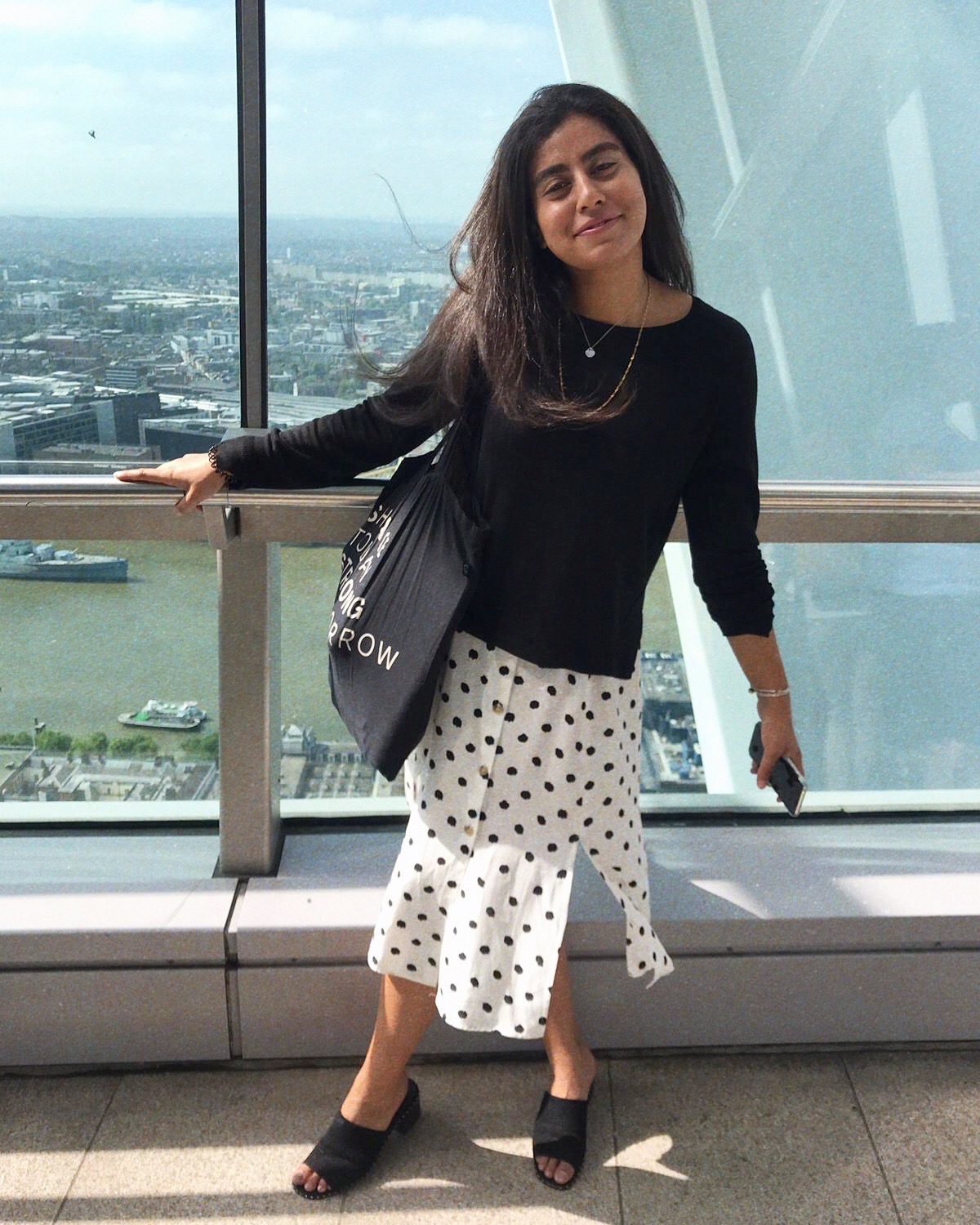
But he is not naïve and knows that contemporary Middle East politics can segue its way into a conversation that should be entirely free of it. “The main cultural sensitivity is that many Muslims confuse anti-Israeli sentiment with anti-Jewish sentiment,” he says with a sigh.
“When it comes to the Middle East, we treat the Muslim community around the world as a family, as a brotherhood, so what happens there we feel very affected by, and many people in their anger can be misdirected, not towards the actions of the Israeli state, but towards Jews in general, linking both to be the same thing.
“Because of this, they can feel awkward or hesitant to engage with the Holocaust. They see it as a link to Jewishness and Jewishness as a link to Israeli action, so they can approach it with more scepticism, because they feel it is intrinsically linked to Israel itself, and many of them are not happy with Israel’s actions.
“That’s why I’ve personally found, when speaking to Muslim students, I need to stress that what Israel is doing now is completely different to the Holocaust, which must be respected as something entirely separate.”
Owing to this and other factors, does he feel the starting point is different when teaching about the Holocaust to Muslim students, that there is more work to do? “It’s sometimes easier to teach the Holocaust to non-Muslims. They have a more neutral starting point, as they’re not so invested in Middle East conflict.
“I would add that I’ve seen these negative and sceptical attitudes much more in young secondary school students who haven’t yet learned about the Holocaust, and in the older generation who were never taught it. At university, all of my Muslim friends are sensitive to it. So it’s not all Muslims at all.”
Uzma Zahid, 26, who also has Pakistani heritage, was a Muslim ambassador for the Anne Frank Trust (AFT) in 2008 while at college in Bradford. She is now a PhD student in London and a trustee of the charity – the only Muslim board member.
Aged 15, studying religion at Laisterdyke Business and Enterprise School in Bradford, she first learned about Anne Frank. “They linked that to instances of discrimination that were in the media at the time,” she recalls.
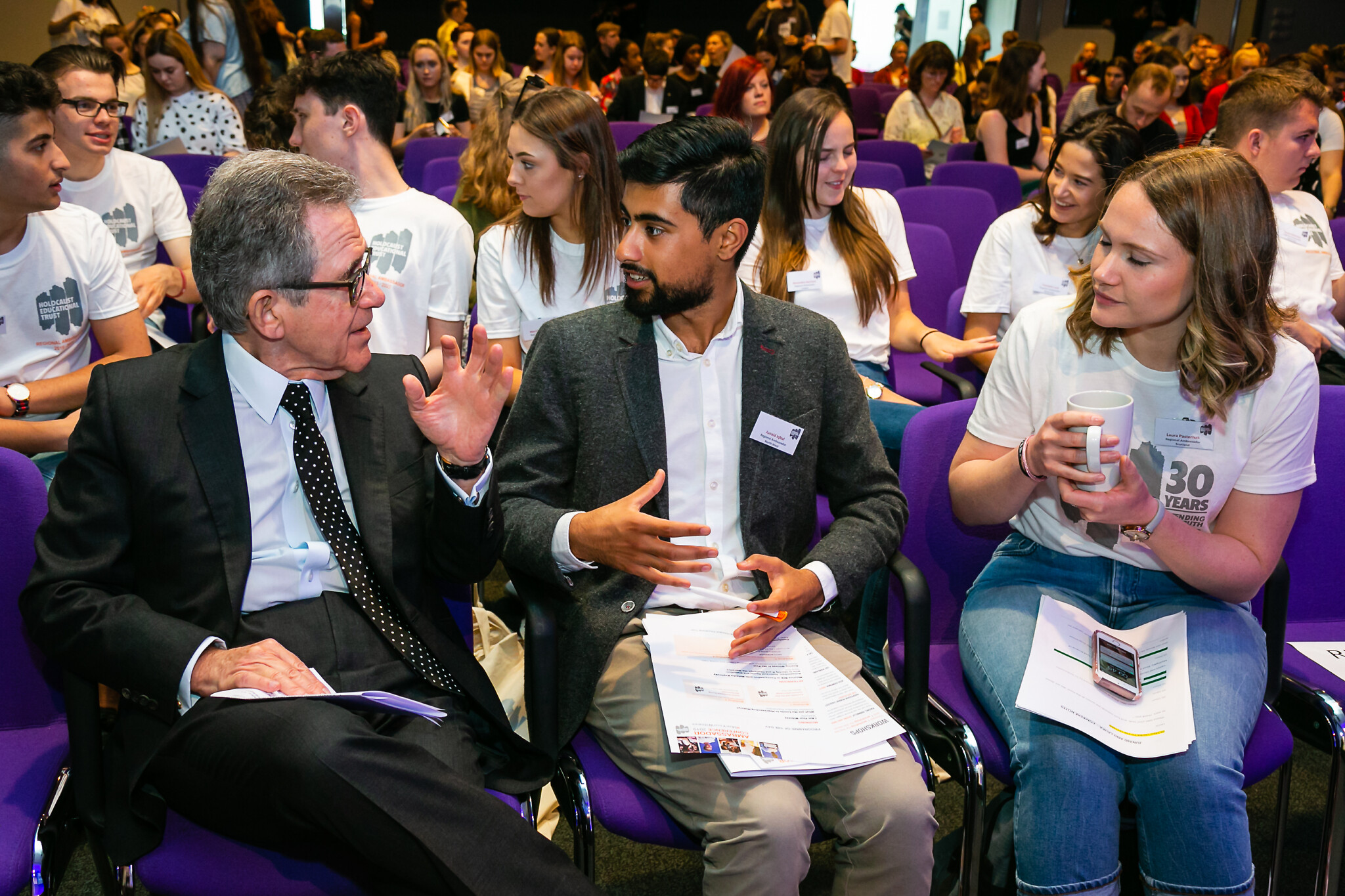
“Afterwards, we held an exhibition at the Cartwright Hall Art Gallery in Bradford that was open to the community. Our family and friends came and we were the guides.”
Like Iqbal, she also encountered antisemitism in the Muslim community in Bradford and, as in Burnley, it related to age-old stereotypes. “Growing up, people would say ‘don’t be a Jew’ about money. At the time I didn’t know what it meant. It’s horrible.”
Does she think Holocaust educators have to work slightly harder in Muslim communities? “From my own experience, yes, there’s an element of
truth to that, although I don’t know why that is. I suppose you need to start at a more basic level.”
Does Israel’s role in the Middle East conflict make Holocaust education in the Muslim community more difficult? She takes her time and is careful what she says. “I have found a lack of knowledge [on the Holocaust in the Muslim community] especially with the older generation. Is it due to frustration over Israel-Palestine? Maybe there’s an element of that, but I think it’s more about people focusing on their own hurt, their own experiences of colonialism and racism.
“Because of the politics of the Israel-Palestine conflict, there is an opportunity for certain people to incite hatred. That’s why it’s more important to invest in Holocaust education in Muslim communities than in others, to get in there early and make things relatable, to show that while they may have suffered, other people have suffered more.”

Thank you for helping to make Jewish News the leading source of news and opinion for the UK Jewish community. Today we're asking for your invaluable help to continue putting our community first in everything we do.
For as little as £5 a month you can help sustain the vital work we do in celebrating and standing up for Jewish life in Britain.
Jewish News holds our community together and keeps us connected. Like a synagogue, it’s where people turn to feel part of something bigger. It also proudly shows the rest of Britain the vibrancy and rich culture of modern Jewish life.
You can make a quick and easy one-off or monthly contribution of £5, £10, £20 or any other sum you’re comfortable with.
100% of your donation will help us continue celebrating our community, in all its dynamic diversity...
Engaging
Being a community platform means so much more than producing a newspaper and website. One of our proudest roles is media partnering with our invaluable charities to amplify the outstanding work they do to help us all.
Celebrating
There’s no shortage of oys in the world but Jewish News takes every opportunity to celebrate the joys too, through projects like Night of Heroes, 40 Under 40 and other compelling countdowns that make the community kvell with pride.
Pioneering
In the first collaboration between media outlets from different faiths, Jewish News worked with British Muslim TV and Church Times to produce a list of young activists leading the way on interfaith understanding.
Campaigning
Royal Mail issued a stamp honouring Holocaust hero Sir Nicholas Winton after a Jewish News campaign attracted more than 100,000 backers. Jewish Newsalso produces special editions of the paper highlighting pressing issues including mental health and Holocaust remembrance.
Easy access
In an age when news is readily accessible, Jewish News provides high-quality content free online and offline, removing any financial barriers to connecting people.
Voice of our community to wider society
The Jewish News team regularly appears on TV, radio and on the pages of the national press to comment on stories about the Jewish community. Easy access to the paper on the streets of London also means Jewish News provides an invaluable window into the community for the country at large.
We hope you agree all this is worth preserving.
-
By Brigit Grant
-
By Laurent Vaughan - Senior Associate (Bishop & Sewell Solicitors)
-
By Laurent Vaughan - Senior Associate (Bishop & Sewell Solicitors)
-
By Laurent Vaughan - Senior Associate (Bishop & Sewell Solicitors)
-
By Laurent Vaughan - Senior Associate (Bishop & Sewell Solicitors)


